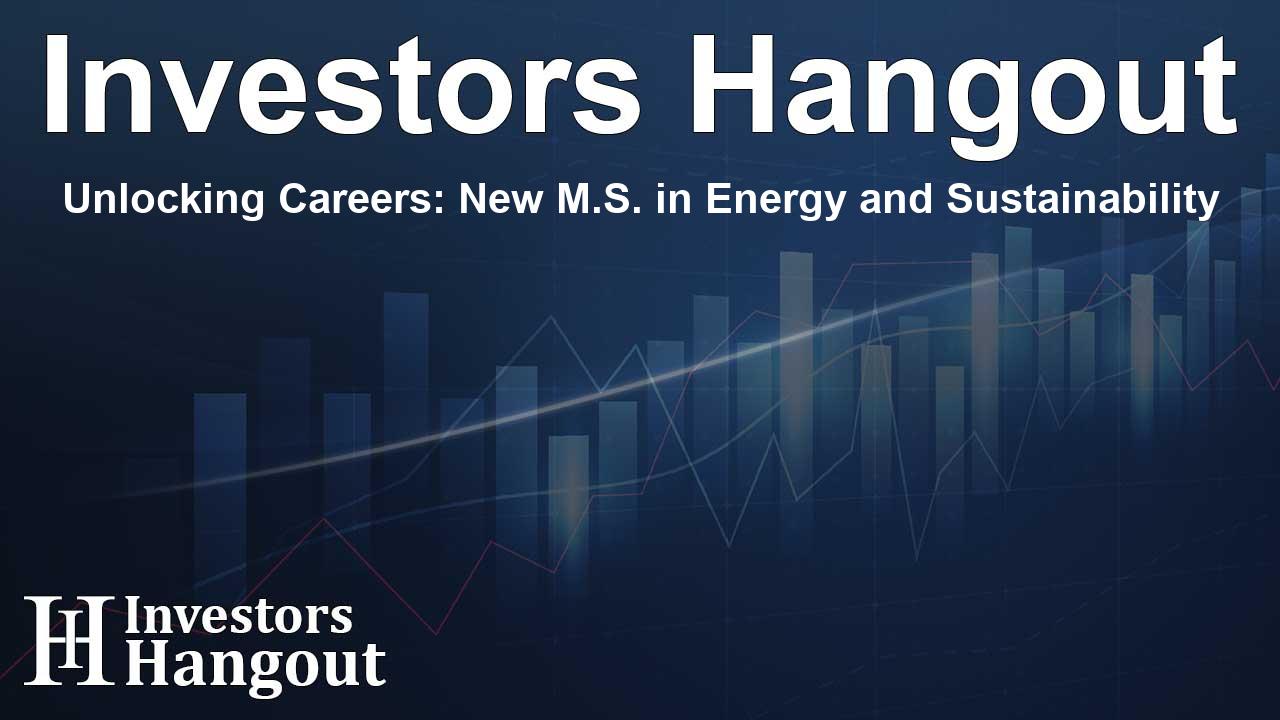Unlocking Careers: New M.S. in Energy and Sustainability

Introducing an Innovative Master's Program at SMU Cox
In an era where the global investment in the energy transition reaches a staggering $1.8 trillion, there is a heightened demand for skilled professionals who can navigate the complexities of this shift. The SMU Cox School of Business recognizes this urgent need and is proud to announce the launch of the Master of Science in Energy and Sustainability Management (MSESM). This program is tailored specifically for individuals aiming to take on leadership roles that influence the trajectory of businesses as they adopt sustainable practices and transition to low-carbon energy sources.
Meeting the Growing Demand for Sustainability Expertise
The energy landscape is evolving rapidly, and industries ranging from aviation to consumer goods are seeking individuals with specialized competencies in energy management and sustainability. The MSESM program aims to equip graduates with the necessary tools to assess and manage climate-related business risks. Through a focused curriculum that merges finance, accounting, management, and energy operations, students will learn not just to conform to current practices, but to drive innovative and sustainable change within their organizations.
Curriculum Designed for Business-Relevant Skills
Professor Kumar Venkataraman, an esteemed member of the SMU Cox faculty and the Maguire Chair in Energy Management, emphasizes the critical nature of this program. “Our graduates will gain essential skills to guide businesses during their energy transition,” he explains. The coursework offers insights into integrating climate risk into better project management, capital valuation, and comprehensive carbon emissions reporting. Graduates will find themselves well-prepared for careers not only in traditional energy sectors but also in dynamic roles within corporate sustainability teams and environmental consulting firms focused on energy efficiency and decarbonization.
Specialization Tracks to Tailor Your Journey
The MSESM program spans nine months and offers students the flexibility to specialize in one of three tracks:
1. Accounting
Students pursuing this track will learn to accurately assess and disclose climate-related costs alongside a company's carbon footprint presented in financial statements.
2. Finance
This track focuses on the financial evaluation of sustainability projects aimed at significantly reducing carbon emissions, preparing students for impactful roles in finance related to sustainability.
3. Operations
In this specialization, students will develop the crucial skills needed to identify and mitigate operational risks stemming from climate-related disruptions, ensuring business continuity and resilience.
Application Process and Future Sessions
Those enthusiastic about advancing their careers in the realm of energy and sustainability are invited to apply. It is important to participate in the upcoming Energy at Cox webinar on January 30, with classes commencing in fall 2025. Aspiring students are encouraged to bring their applications forward as the program details continue to evolve, subject to approval by institutional authorities.
About SMU Cox School of Business
The SMU Cox School of Business has a rich history that dates back 100 years, dedicating itself to unveiling deeper insights into business innovations and practices. The school prides itself on its reputation as a top business education provider, challenging the traditional paradigms of efficiency and corporate success. Accredited by AACSB, SMU Cox continues to support a global network of alumni and offers a variety of educational programs ranging from BBA to professional MBA degrees and various master’s degrees.
Frequently Asked Questions
What does the new M.S. in Energy and Sustainability Management focus on?
The program emphasizes integrating climate risk and sustainability into business practices, preparing students for modern challenges in the energy sector.
What are the specialization tracks in the program?
Students can specialize in Accounting, Finance, or Operations, focusing on areas like climate-related costs, sustainability projects, and reducing operational risks.
How long is the program?
The MSESM program can be completed in just nine months, making it an efficient option for those looking to advance their careers quickly.
When are classes expected to begin?
Classes for the new program are scheduled to start in fall 2025, with applications now open.
What is the significance of this program?
This program aims to create a new generation of leaders equipped to drive sustainability initiatives in various industries undergoing energy transitions.
About Investors Hangout
Investors Hangout is a leading online stock forum for financial discussion and learning, offering a wide range of free tools and resources. It draws in traders of all levels, who exchange market knowledge, investigate trading tactics, and keep an eye on industry developments in real time. Featuring financial articles, stock message boards, quotes, charts, company profiles, and live news updates. Through cooperative learning and a wealth of informational resources, it helps users from novices creating their first portfolios to experts honing their techniques. Join Investors Hangout today: https://investorshangout.com/
Disclaimer: The content of this article is solely for general informational purposes only; it does not represent legal, financial, or investment advice. Investors Hangout does not offer financial advice; the author is not a licensed financial advisor. Consult a qualified advisor before making any financial or investment decisions based on this article. The author's interpretation of publicly available data shapes the opinions presented here; as a result, they should not be taken as advice to purchase, sell, or hold any securities mentioned or any other investments. The author does not guarantee the accuracy, completeness, or timeliness of any material, providing it "as is." Information and market conditions may change; past performance is not indicative of future outcomes. If any of the material offered here is inaccurate, please contact us for corrections.